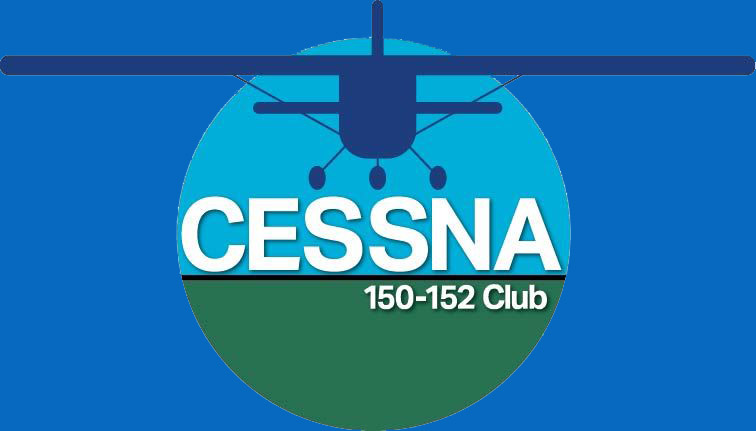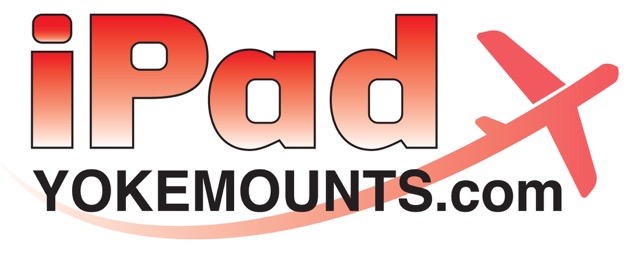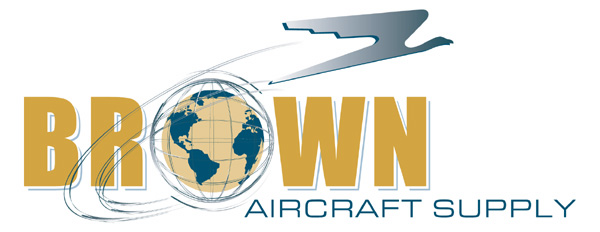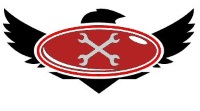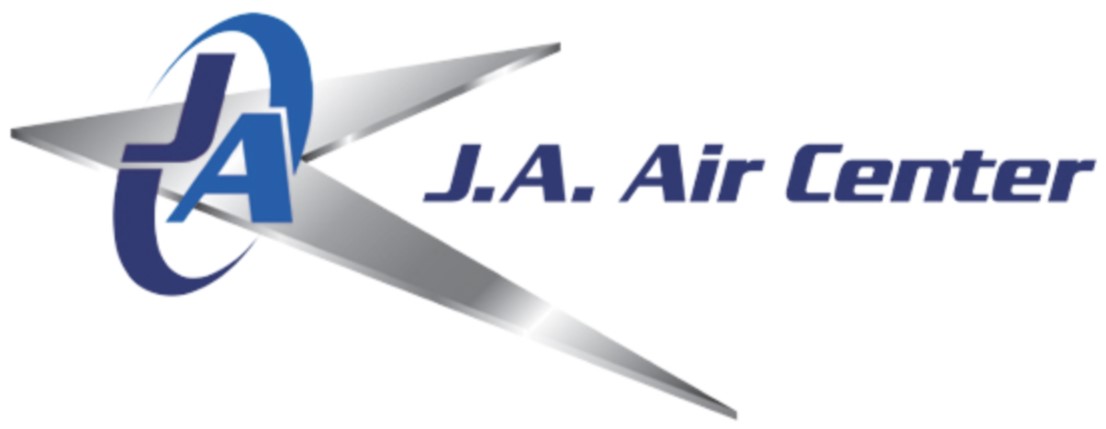Cost of Ownership
How much does it cost to buy a Cessna 150 or 152?
Like cars, the sales prices of Cessna 150s and 152s are determined by the airplane’s condition and how it is equipped. In 2010 the average sales price for a Cessna 150 in good condition was about $18,000. Cessna 152s were slightly more valuable, with an average price of $22,500. Airplanes with expensive radios, paint jobs, and/or larger horsepower engines typically sold in the $25,000-$30,000 range. The market for these upgraded Cessna 150s and 152s is quite small because it’s possible to buy a low budget 4 seat airplane for just a bit more. In 2020 the price of used airplane took off. Those $15,000-$22,000 airplanes are now $30,000 and up.
While it is possible to find “deals” on a Cessna 150 or 152, the likelihood of buying an airplane in good condition for under $15,000 is very small. It is common to find Cessna 150s and 152’s on eBay or elsewhere for sale in the $12K-$15K range. These airplanes are often neglected or have engines that are close to overhaul. The cost of field overhauling the engine in these airplanes can easily exceed $10,000, turning a $15K airplane into a $25K airplane, that’s actually worth about $18K.
Occasionally we find a nice Cessna 150 or 152 that is advertised well below its real value. This is typically the result of an owner’s need to quickly resolve a financial hardship, or perhaps an estate sale, where the heirs are anxious to cash out, or may be unaware of the airplane’s real value. These “Deals” are exceedingly rare. In most cases, if a “deal” seems to be too good to be true, IT PROBABLY IS! An airplane that seems unusually cheap requires very careful inspection and historical research to make sure it doesn’t have expensive skeletons hiding in its closet.
Used Airplane Values
The “Blue Book” for airplanes is called “Vref.” AOPA members can perform free Vref evaluations on the AOPA website. Unfortunately, the Vref system is optimized for the insurance industry, and is notorious for undervaluing less expensive airplanes.
Here’s the problem: Since the airplanes are used and condition varies widely, their value is quite subjective and difficult to quantify. The insurance industry would prefer to err on the low side, so Vref evaluations are typically $4,000-$7,500 below what the airplanes are actually selling for. In the case of a $200K Mooney or Bonanza, this is only a 2-4% reduction in true value, but in a $20K Cessna it’s a whopping 20-40% undervaluation.
Since insurance companies use Vref to calculate replacement value, a new owner has to “prove” that his airplane is worth what he paid for it when purchasing insurance by making an official statement that it is in better than average condition etc.
How do Cessna 150s and 152’s compare to the ownership cost of cars?
It is very tempting to compare the cost of buying and owning a Cessna 150 or 152 with a car, and you could purchase a decent Cessna 150 or 152 for about the same price as a Toyota sedan. However, the comparison is apples to oranges. Though the purchase price is similar, that is where the comparison ends.
When purchasing a car, the sales price is the largest consideration. Modern cars are normally quite reliable and require very minimal maintenance compared to airplanes. Once a car is purchased, all that is required is fuel, oil changes, and an occasional tune up. In some states a smog check is required every couple of years.
By comparison, the sales price of an airplane is an important consideration, but only represents a portion of the cost of ownership. Like most private airplanes, Cessna 150s and 152s are based on very old technology. Their engines and airframes were designed in the late 1940s.
Airplanes are also operated in a very different way than cars. For example, an airplane engine is normally operated at 70-100% power most of the time. By comparison, a car engine is loafing at 30-40% of it’s power output at highway speeds. Imagine how long your car engine would last if you drove everywhere in a low gear at full throttle…
Most cars are driven nearly every day, this keeps engine oil circulating, which is good for engines. The typical private airplane is flown less than 100 hours a year, or less than 2 hours a week.
A modern car will happily go past 100,000 miles with just occasional oil changes and tune-ups, but airplanes require a full inspection every single year. This annual inspection is required by law, even if the airplane has not been flown at all since the previous year. The cost of these inspections on a Cessna 150 or 152 in good condition range from a low of about $500 to a high of about $1,500. If the inspection uncovers serious problems, the cost to repair it can easily exceed the value of the airplane. While car parts are quite cheap and plentiful, airplane parts are in limited supply and very expensive. For example, a starter that might cost $75 on a car, can cost hundreds of dollars for an airplane, even though it appears to be nearly the same part. The difference is that aircraft parts must meet a very rigid legal standard for quality and performance, and they are produced in very small quantities.
Costs can be divided into three categories:
1. Operational costs: This includes fuel, oil, and replacement of things like spark plugs, filters, tires and light bulbs. These costs remain fairly constant and can be estimated quite accurately. For example, an owner can easily divide the cost of fuel and oil by how much of each is required for each hour flown. The average operational cost for the Cessna 150 and 152 is between $40 and $50 per hour, largely dependent on the cost of fuel. (both aviation and car gasoline can be used with the appropriate approval.) The national average price of aviation fuel is ~$6.00. A Cessna 150 with the stock engine consumes about 6 gallons per hour, so the fuel cost is approximately $36.00 per hour.
2. Fixed costs: This includes insurance, annual inspections, parking tie-down or hangar, and loan payments. We won’t address the loan question here, but our downloadable worksheet (below) provides a way to calculate the effect of loan payments on the cost of ownership. The fixed cost remains about the same, whether the airplane is flown one hour a year or a thousand.
3. Reserves: This includes planning ahead for the most expensive of all ownership costs, an engine overhaul. The Continental O-200 engine in the Cessna 150 is rated for 1,800 hours of use before overhaul. The Lycoming O-235, in the Cessna 152 interval is 2,400 hours. The cost of overhaul varies widely, but is at least $10,000 for a low budget field overhaul, up to $40,000 for a factory overhaul. Additional reserves are used for things like keeping the airplanes radios up to date, paint jobs and interior refurbishment.
What’s it all boil down to? For a typical pilot who flies about 100 hours a year, the minimum cost per hour is about $60 for an airplane with no loan payments, to a high of about $120 an hour for an airplane with a $25,000 loan.
Then there’s the Government
The good news is that FAA aircraft registration is very inexpensive, only $5.00 every seven years! Yes, really!
By comparison State and local government fees can be downright oppressive. These kinds of fees are often cloaked as “Use Taxes” or “Luxury Taxes”. It’s nice to know that state and local government’s view owners of $20,000 Cessnas in the same class as owners of yachts and Ferraris. Some states even require an annual “license” registration. In a recent search of Cessna 150-152 taxes, we found an annual range from a low of $50 in Kenai, Alaska, to a high of $528 in Norfolk, Virginia.
Don’t budget for aircraft ownership without a full review of the taxes you may be required to pay to state, county and even city governments.
Aircraft Cost Worksheet
Below is a fully customizable Ownership Cost Worksheet. You can download this worksheet and plug in your own numbers to see what you actual, estimated cost of ownership might be.
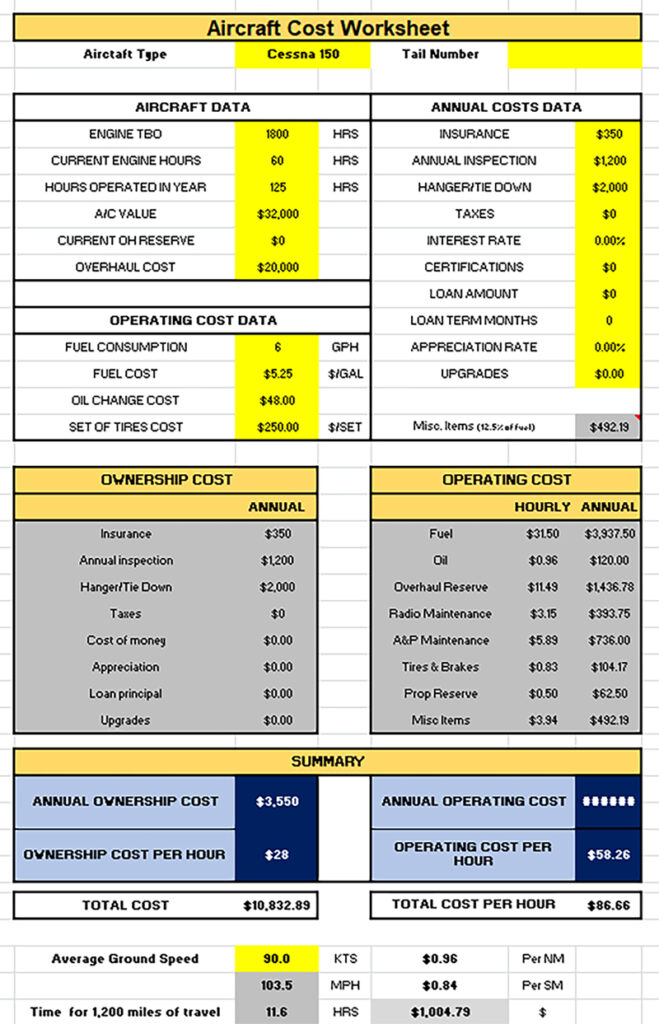
Aircraft Cost Worksheet Download .xslx
